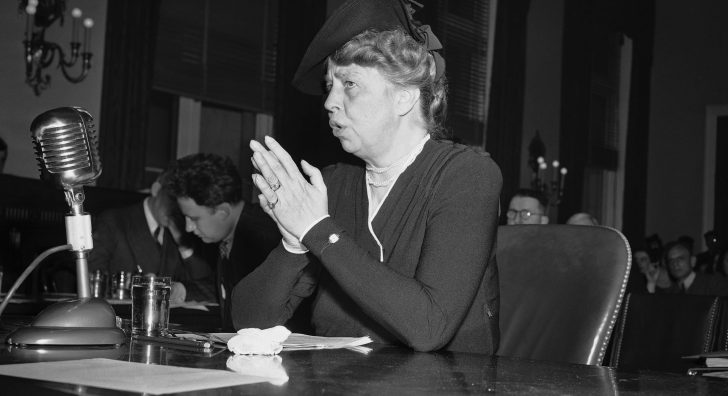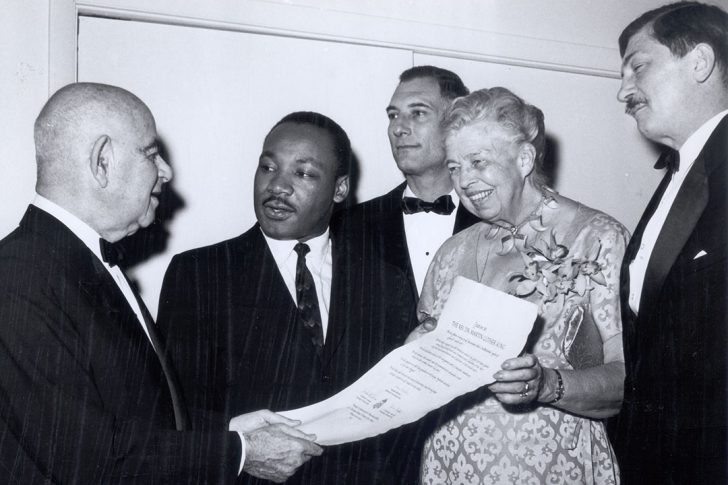Eleanor Roosevelt, the First Lady of the United States from 1933 to 1945, was known for her unwavering dedication to social justice and human rights. But what was the impact of Eleanor Roosevelt's resignation letter, and how did it bring racial discrimination into the national spotlight?
In this article, we will explore that in depth:
What Was the Impact of Eleanor Roosevelt's Resignation Letter?
The impact of Eleanor Roosevelt's resignation letter was profound. By stepping down from her position in the Daughters of the American Revolution (DAR), she sent a powerful message about racial equality. The DAR had denied African American opera singer Marian Anderson the opportunity to perform at Constitution Hall, a decision rooted in racial prejudice.
Roosevelt's resignation highlighted this injustice. It forced Americans to confront the pervasive racism in society.

National Archives / Eleanor Roosevelt's unprecedented resignation letter brought racial discrimination into the American national limelight.
Remember, Roosevelt's bold action did more than just criticize the DAR. it amplified the voices of those fighting for civil rights. Her resignation letter became a symbol of moral courage, inspiring others to take a stand against racial discrimination.
Likewise, it also attracted widespread media attention, drawing public scrutiny to the practices of organizations like the DAR and sparking conversations about race relations in America.
Mrs. Roosevelt (1884 - 1962) was A First Lady Ahead of Her Time!
As First Lady, Eleanor Roosevelt was not content to merely fulfill ceremonial duties. She used her platform to advocate for the marginalized and voiceless, often challenging the status quo. Her resignation from the DAR in 1939 was a pivotal moment that showcased her commitment to equality and justice.
By making a personal sacrifice, she demonstrated the importance of standing up for what is right. Even when it is not a popular or easy choice.
Eleanor Roosevelt's actions resonated deeply with the American public. Her willingness to confront discrimination head-on and her subsequent public statements on the issue helped to shift public opinion. People began to question the societal norms that allowed such prejudice to exist. Thus, it paved the way for future civil rights advancements.
The Former First Lady Amplified the Call for Equality
What was the impact of Eleanor Roosevelt's resignation letter? It was a catalyst for change. Roosevelt's letter not only condemned the DAR's actions but also called for a broader societal reckoning with racism. Her decision to leave the organization underscored the need for systemic change and highlighted the power of individual action in the fight against injustice.

Quizlet / It was Eleanor Roosevelt’s legendary resignation that led to the momentum of the Civil Rights Movement in the 1950s and 1960s.
This moment in history demonstrated how influential figures could use their status to effect social change. Roosevelt's resignation was covered extensively by the media, bringing national attention to the issue of racial discrimination. This coverage played a crucial role in raising awareness and mobilizing public support for civil rights.
The Lasting Impact of Eleanor Roosevelt's Resignation
It set a precedent for future leaders and activists, showing that taking a stand against discrimination was not only possible but necessary. Her courage inspired countless others to fight for justice. Thus, contributing to the momentum of the civil rights movement in the 1950s and 1960s.
Her actions also had a personal impact on those who followed her work. Many were moved by her willingness to risk her reputation and position for the sake of equality. This legacy of moral leadership continues to inspire activists and leaders today, reminding us of the importance of integrity and courage in the pursuit of justice.
By publicly opposing an organization like the DAR, she questioned the legitimacy of institutions that upheld discriminatory practices. This act of defiance encouraged others to scrutinize and challenge the status quo, fostering a culture of activism and resistance.



